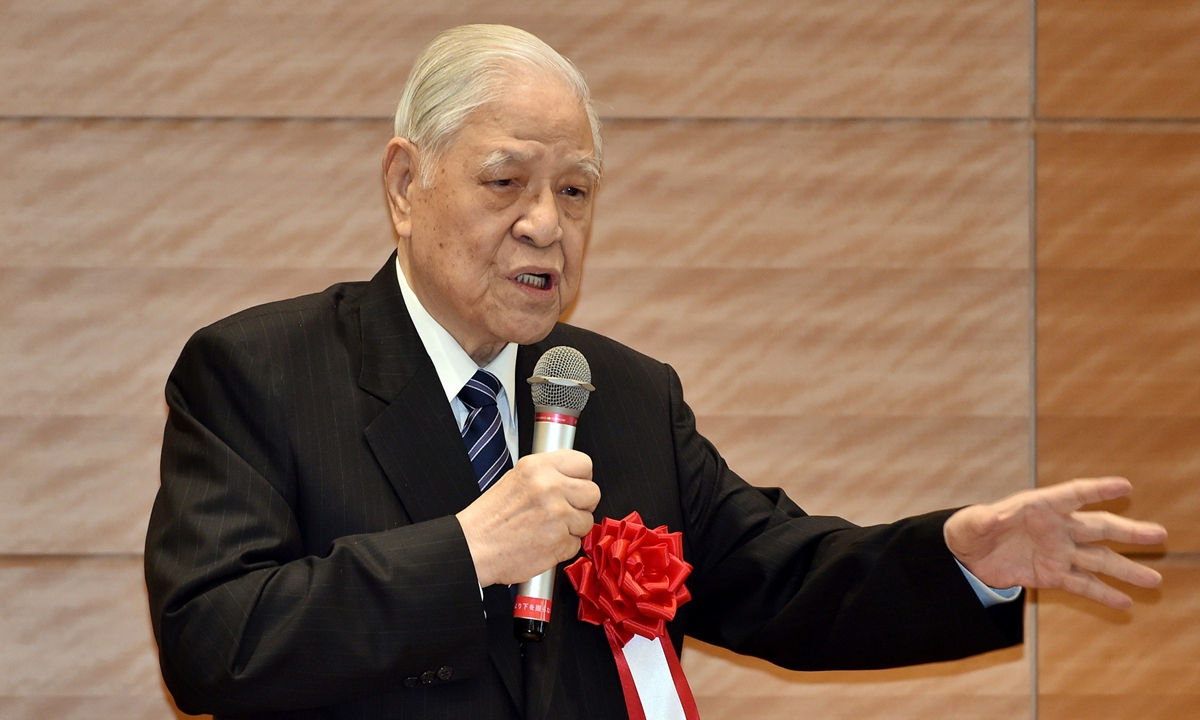DPP ‘will capitalize’ on Lee Teng-hui’s death
By Yang Sheng and Fan Lingzhi Source: Global Times Published: 2020/7/31 21:08:40

Former Taiwan regional leader Lee Teng-hui File photo: VCG
After the death of the "godfather of Taiwan secessionism," Lee Teng-hui, was announced on Thursday, several politicians tried to capitalize on the former Taiwan leader's death, including US Secretary of State Mike Pompeo and the current leader of the island, Tsai Ing-wen, with experts saying they continue to push for separatism and spread an anti-China sentiment.
Tsai, who is also the chairman of the separatist Democratic Progressive Party (DPP), said on social media Thursday that she ordered the authorities on the island to provide the "highest-standard assistance" to issues related to Lee's death.
Pompeo also said in a statement on the US State Department's website on Thursday that "On behalf of the American people, I would like to offer my sincere condolences on the passing of former Taiwan President Lee Teng-hui."
Wang Wenbin, a spokesperson of the Chinese Foreign Ministry, said at a routine press conference on Friday that "we have taken note of the statement. Taiwan secessionism is a dead end, and the reunification and national rejuvenation of China is the trend of history, which is unstoppable to any individual or force. We urge the relevant countries to uphold the one-China principle, to cautiously handle the matters about Taiwan, and not to send wrong information to Taiwan separatist forces."
Chang Ya-chung, a professor at the National Taiwan University and a member of the pro-reunification Kuomintang (KMT), told the Global Times that although Lee was the chairman of the KMT, the DPP's major rival in Taiwan, Lee is more like a leader of the separatist DPP. "Without Lee's support, the separatist sentiment of Taiwan and the DPP would not have become as powerful as it is today."
Lee, who took office in 1988 and retired in 2000, has long been decried as the "godfather of Taiwan secessionism" by people from the mainland and Taiwan, and because of his flattering attitude toward Japan. Denying his Chinese identity was heavily criticized by Chinese on both sides of the Taiwan Straits.
Lee's separatist tendencies in the 1990s almost caused a military conflict between the mainland and the island, after he broke with the 1992 Consensus and the one-China principle to promote separatism for the island.
He also provided significant support to separatism's growth in the island, and offered valuable assistance to the DPP to turn it into the KMT's main rival, and challenge Chinese culture and identity in the island.
After he left office, Lee continued to push for secession. Lee and other extreme separatists of the island established a political group called the "Formosa Alliance" in 2018 to push for an "independence referendum" in Taiwan to continuously threaten the peace and stability of the Taiwan Straits.
Chang said, "For Tsai and her DPP, praising Lee is praising their own political ideas, and Tsai also wants to capitalize on Lee's death to invite figures from Japan and the US to increase Taiwan's visibility in the international arena for their separatist purpose. Pompeo just wants to make the Chinese mainland uncomfortable, since praising Lee costs him nothing to offend China."
Pompeo said that "During his 12-year tenure, Lee's bold reforms played a crucial role in transforming Taiwan into the beacon of democracy we see today. He cemented the deep friendship between the United States and Taiwan."
Chang said the West praised Lee for transforming the island into a democracy, but don't know that the democracy built by Lee is based on dividing the local people in Taiwan and people from the mainland who have been living on the island since 1949, when the KMT authority was defeated by the Communist Party of China, and retreated to Taiwan.
Another cost of Lee's "democracy" in Taiwan is corruption, as Lee started to engage with the local forces in power-for-money deals to increase localism and separatism, said Chang, adding that "these are the evil facts hidden behind the 'democracy' Lee established on the island."
After Lee's death, people in Taiwan were divided, why some are celebrating and some others praising him, which is a proof of the dividing society that he created, Chang noted.
The KMT also released a statement on Lee's death, saying Lee used to be the chairman of the KMT but made the KMT walk a totally different path, and "he will be judged by future generations." The former leaders of the KMT also expressed the same attitude as they refused to directly criticize the damage that Lee had brought to the KMT and cross-Straits relations.
The KMT has lost its spirit and the reason why many former leaders of the party refused to criticize Lee is that they were all get promoted by Lee, so due to the restriction of Chinese traditional culture or opportunistic reason for politics, they refused to directly criticize Lee as most of them have received kindness from him.
The sentence "he will be judged by future generations" in the KMT statement means the KMT and former party leaders refuse to praise him and disagree with his idea and policies, Chang added.
RELATED ARTICLES:
Posted in: HK/MACAO/TAIWAN,REPORTER1